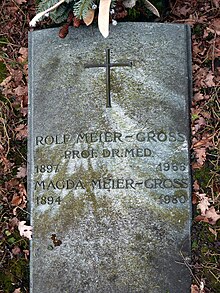Rolf Meier (chemist)

Rolf Georg Meier (born April 7, 1897 in Freiburg / Elbe ; † November 5, 1966 in Basel ) was a German-Swiss pharmacologist and doctor .
Life
Meier was born as the son of the post administrator Johann Heinrich Georg Meier and his wife Emilie, née Krüger, the youngest of three brothers. After passing the high school diploma in Cuxhaven in 1915, he studied mathematics in Göttingen for a year. From October 1916 until his discharge in February 1919, he did military service as a one-year volunteer , first as a musketeer , then as a medic in an infantry regiment. He took part in numerous skirmishes in Champagne and Lorraine , remained uninjured and was dismissed as a medical vice-sergeant with the Iron Cross 2nd class and a very good certificate of good conduct. Then he started studying medicine and chemistry. During his later work in Berlin in the 1920s, Meier met his future wife, Magda Gross, who worked as a librarian at the Hungarian Institute . She came from Budapest and was originally of Jewish faith . In 1921 she converted to Christianity and was accepted into the Reformed Church. In 1929 the marriage took place in Berlin-Dahlem, in 1931 their daughter Christiane was born in Leipzig as the only child .
In 1942, Rolf Meier, now living in Basel, received Swiss citizenship .
Professional background
After passing the state medical examination in 1921/22, he received his license to practice medicine . As a volunteer assistant at the Pharmacological Institute in Göttingen , he received his doctorate there under Professor Heubner in April 1923. 1923/24 he worked at the Physiological Institute of the University of Kiel with Otto Meyerhof . Then from 1924 to 1927 he took on a scheduled assistant position at the Pharmacological Institute in Göttingen. For further training he stayed at the Medical University Clinic in Leipzig with Paul Morawitz and at the Kaiser Wilhelm Institute for Biology in Berlin-Dahlem, where he worked on tissue-breeding studies with Albert Fischer . On July 1, 1929, he took over the management of the scientific and clinical laboratory at the Leipzig University Hospital (Morawitz). His clinical focus was on metabolic and kidney diseases. In 1931 he became a clinical senior physician and completed his habilitation in internal medicine .
In March 1935, on the recommendation of Wolfgang Heubner, he was appointed head of the Pharmacological-Biological Institute of the Society for Chemical Industry in Basel (Ciba) to Basel.
In 1936 he was re-qualified for pathological physiology at the University of Basel, and in 1943 Rolf Meier was appointed associate professor. In 1944 he took over the interim chair for pharmacology at the University of Basel as the successor to Hans Staub for two years, but was not ready to take on a definitive takeover with regard to his institute at Ciba, as he also refused appointment requests from universities outside of Switzerland.
Scientific work
His experience in theoretical and practical medicine was the prerequisite for the development of a large number of drugs; Sulfonamides (Cibazol), vasoactive substances (Priscol, Privin, Regitine), spasmolytics (Transentin, Antrenyl), antihistamines (Antistin), steroid hormones, agents with effect on the central nervous system (Serpasil, Ritalin). At the Dies Academicus in 1957 at the University of Basel, Rolf Meier was awarded an honorary doctorate by the Faculty of Philosophy and Natural Sciences, especially for his work, which enabled insights into the dependence of biological effects on chemical structural factors.
swell
- Professor Rolf Meier on his 60th birthday. In: International Archives of Allergy and Immunology . 10, 1957, doi : 10.1159 / 000228359 .
| personal data | |
|---|---|
| SURNAME | Meier, Rolf |
| ALTERNATIVE NAMES | Meier, Rolf Georg (full name) |
| BRIEF DESCRIPTION | German-Swiss chemist and physician |
| DATE OF BIRTH | April 7, 1897 |
| PLACE OF BIRTH | Freiburg / Elbe |
| DATE OF DEATH | 5th November 1966 |
| Place of death | Basel |